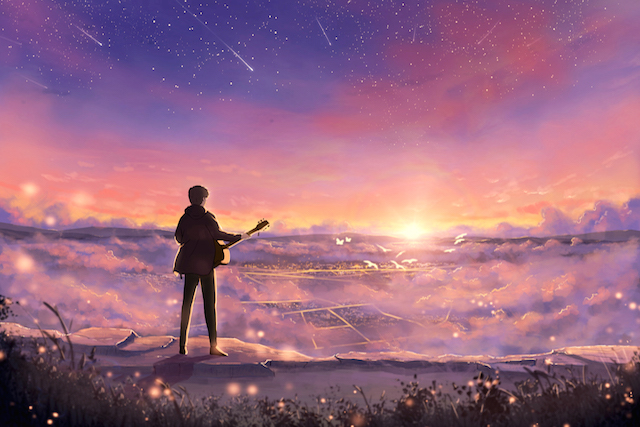
“The only way we can change the way we feel is by becoming aware of our inner experience and learning to befriend what is going inside ourselves.” ~Bessel A. van der Kolk
Learning to be alone as an adult has been a struggle for me. It’s taken quite a while for me to adjust to spending periods of time by myself. It may sound strange to those who know me because I am most definitely an introvert and need my quiet time. However, my time alone was never quite as satisfying as I’d hoped it would be.
Often my solitude dissolved into sadness, and I didn’t have a particular reason why. My alone time wasn’t productive, and it just made me feel out of sorts. It was frustrating because I knew I needed time to myself, but I couldn’t stand to be alone.
Once I began to get curious about the sadness and apathy I’d feel when I was alone, things started to shift.
One day, I noticed that a particular script would begin to play in my mind over and over again. No matter what time of day or the length of alone time, I could begin to hear it play. It said, “You are alone. You are always going to be alone. No one could truly love you. You are unworthy of love.” This tape has played for so long I am unsure if it will ever fully go away.
In the past too much alone time would leave me depressed or even suicidal, and it’s no wonder why. Hearing such awful things on a loop for an extended period of time would wear on anyone.
I spent long periods where I was afraid to spend time alone because I knew I’d end up in a rough spot. I did all I could to avoid it. I’d go to bed early, keep my schedule full, spend all my time with my roommate, and more.
Spend enough time trying, and you’ll soon learn that avoiding solitude is very difficult as a single adult. I knew that, at some point, I had to stop avoiding and figure out what was going on.
At first, all I did was notice these thoughts happening. I found that this script was common in my life. This same tape would play when I made silly mistakes at work or a friend didn’t get back to me right away. Maybe it wasn’t just about being alone after all. Maybe this was something deeper.
So I stayed curious about this dialogue in my head. I kept thinking through it when I could. I talked to my therapist and my mentor about it too. Eventually I had a realization that this script and my time alone were a reflection of all the down time I had as a child.
Growing up, I didn’t see my friends outside of school very often, and I didn’t spend a lot of time with my family. Instead, I spent a lot of time alone.
When I first thought it through, I just figured I was a normal kid who got bored a lot. Thinking further, however, I realized those moments alone went well beyond typical boredom. What I wanted most during those times alone was attention and love. I wanted to feel valued and appreciated, but I didn’t.
I didn’t have the connections with others that I truly wanted or needed at the time. I spent long periods of time being pretty sad and feeling deeply lonely. I felt unloved and unworthy of being loved. Sounds familiar, doesn’t it? It’s exactly how I feel when I am alone as an adult. It’s that damn script again telling me I’m alone in the world.
This realization was huge for me because, though my life as an adult is drastically different than my life as a child, I recognize that I’m still healing from past trauma and neglect. Something in me still connected being alone with being lonely. My inner child was still suffering, and it made itself known through this terrible dialogue playing on loop.
I am in a different place as an adult. I have made choices to surround myself with a community of loving people who support and care for me. I’m not actually alone anymore. Somehow making this connection felt empowering.
That was then, I thought. This is now. I decided it was time to take my power back and resist the script. Next time I had the chance for some alone time, I was determined to move through it differently. I wanted to teach my inner child that not all solitude is lonely.
So the time came again where I was alone and the familiar sadness began to well up, but I was prepared. I knew it was coming and I had a plan.
I had calming music playing in the background and some of my favorite activities ready for me. My journal was out for writing, my canvas was out for painting, my machine was set up for sewing, and I had a book out too. And you know what? The tape in my head didn’t seem so loud. I could still hear it, but it didn’t paralyze me or send me to bed early. I enjoyed being alone.
I share this all in hopes of encouraging anyone else who might struggle too. There were a few key things that helped me move through this experience.
First, I stopped avoiding and fighting my feelings. Avoidance keeps us stuck in the same patterns. It’s important to get curious about our thought patterns and our feelings.
Asking questions like, “I wonder what perpetuates that thought?” and “Does this emotion happen at certain times?” can help things begin to shift. If it may help, I encourage you to sit down with a mentor or a therapist and talk it out.
Getting really honest about the answers to those questions requires that we sit with the discomfort for a bit and connect in to our inner selves. It’s uncomfortable, but so very worth it. Ultimately, this can help us nurture ourselves. Once we know what we need, we can begin to nourish the parts of ourselves that desperately need it.
About Lesa Ashlea Rankin
Lesa is a lover of cats, yoga, and writing. In recovery from severe depression and an eating disorder, she believes in compassion for all beings. Human connection gives her purpose. She is a yoga teacher and in her spare time loves to walk with friends, mentor youth, and read novels. She lives in suburban Philadelphia with two cats and her loving boyfriend.












 Though I run this site, it is not mine. It's ours. It's not about me. It's about us. Your stories and your wisdom are just as meaningful as mine.
Though I run this site, it is not mine. It's ours. It's not about me. It's about us. Your stories and your wisdom are just as meaningful as mine.
Happy New Day Lesa,
Your article was an honest testimony as well as a mirrored reflection of myself. Thank You so much for submitting this post. When I hear that script playing in my mind now;
I too will have an agenda of things ready for me to do. WOW!!
-Opal Shaun
Living My Best Life Know
Thank you for this article. Reading it just at the right moment as I am spending quite a lot of alone time now. I can relate to everything your are saying and am sure many others can too. It seems as though the older I get the more uncomfortable I feel being alone. It has come to a point where even just a few hours being alone can push me into a deep dark corner of my mind with no escape. Reconnecting with my inner self is essential.
Lesa, every word written by you resonated with me deeply. It is as if you articulated everything I feel on a daily basis but just couldn’t express. This post is very therapeutic for me. Just knowing someone out there feels exactly how I feel means a lot to me.
Thanks a lot for sharing your thoughts here. I wish you the best in everything. Hope peace and love find you wherever you go.
Excellent article. It more or less resembles my life.
Good article. I often refer to myself as an outcast. To a large degree that is how I see myself despite being a loving, friendly, smart. etc person. For one reason or another, the causes of why certain people are shunned ridiculed and treated like they and their feelings do not matter are not known. After my mum passed 6 years ago, there was soul crushing loneliness and very little support from others. At times it felt as though I were at the bottom of a dark pit and no one knew I was there and would die forgotten and alone. Yes, that is a bit dramatic, but I am sure some can relate to it.